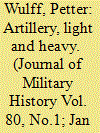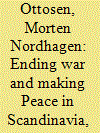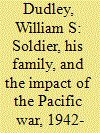| Srl | Item |
| 1 |
ID:
144232


|
|
|
|
|
| Summary/Abstract |
What does it feel like to witness the collapse of a regime? This article explores this question by looking at the end of the First French Empire as seen through the eyes of state officials, soldiers, and military doctors among others. I follow retreating French forces from 1814 through to the subsequent reconstruction of wartime memories in order to grasp an “inner life” of defeat dominated by related lethal epidemics of typhus and melancholy moods known to contemporaries as “nostalgia.” I argue that these experiences and sensibilities force us to rethink how the Napoleonic wars affected understandings of time and space.
|
|
|
|
|
|
|
|
|
|
|
|
|
|
|
|
| 2 |
ID:
144238


|
|
|
|
|
| Summary/Abstract |
The artillery revolution of the nineteenth century came about partly through collaboration between southern and northern Europe. Their outlooks were quite different. In the south, the Kingdom of Sardinia-Piedmont needed to go on the offensive beyond its borders to achieve its aim of creating a united Italy. In the north Sweden had the defensive aim of protecting its borders against an invading enemy. This situation called for two different kinds of artillery—light and movable in the south; heavy and powerful in the north. How the two countries, in spite of their different outlooks, came to be involved in a joint development of path-breaking artillery technology is the subject of this article.
|
|
|
|
|
|
|
|
|
|
|
|
|
|
|
|
| 3 |
ID:
144237


|
|
|
|
|
| Summary/Abstract |
The Napoleonic wars had a tremendous impact on the Scandinavian countries. Political and social upheaval and economic disruption ensured that ending war was no straightforward or rapid process. For traumatized veterans and those who had lost a husband or father, war never quite ended, to say nothing of those who remained under military occupation even after the nominal conclusion of peace. Still, the parallel process of making peace after 1815 was quite remarkable in Scandinavia, as 300 years of bitter rivalry, enmity, and perpetual conflict rapidly gave way to reconciliation to a point where Scandinavian union was a more likely outcome than a future Scandinavian war.
|
|
|
|
|
|
|
|
|
|
|
|
|
|
|
|
| 4 |
ID:
144234


|
|
|
|
|
| Summary/Abstract |
The former officers of the Grande Armée have often been seen as die-hard supporters of Napoleon, with the government of the Bourbon Restoration viewing them with particularly acute suspicion. An in-depth study of the careers and trajectories of officers from the Charente (a department in western France known for its Bonapartism) shows how little these former combatants resemble the clichés painted by legend. In many ways, they were a heterogeneous group whose demobilization was complex and difficult. They nonetheless often shared both a desire to prove their loyalty to France and a continued hope that the state would recognize, both materially and symbolically, the sacrifices they had made in the name of the nation.
|
|
|
|
|
|
|
|
|
|
|
|
|
|
|
|
| 5 |
ID:
144233


|
|
|
|
|
| Summary/Abstract |
At the end of the Napoleonic Era, France experienced three years of invasions and occupations that increased collective and inter-individual violence. This article analyzes an affair that occurred around Unverre, near Chartres, during the summer of 1815. While we still don’t know whether it constitutes an exception in a stream of receding violence or shows the persistence of deep-seated violence in rural France, this case illustrates the complications of the “end” of war within France.
|
|
|
|
|
|
|
|
|
|
|
|
|
|
|
|
| 6 |
ID:
144239


|
|
|
| 7 |
ID:
144236


|
|
|
|
|
| Summary/Abstract |
Pamphlets provide an overlooked corpus for understanding the demobilization of French soldiers in 1814 and 1815. Royalists particularly used the format to persuade combatants to return to civilian life, invoking the wartime suffering of French families to convince both soldiers and civilians to support an uneasy peace and a potentially unpopular ruler. Their writings reveal competing visions of the value and legacy of martial masculinity. Pamphleteers were torn between seeing soldiers as the quintessential victims or most enthusiastic agents of Napoleonic rule, and as wounded men ready for peace or as selfish and relentless warmongers incapable of domesticity.
|
|
|
|
|
|
|
|
|
|
|
|
|
|
|
|
| 8 |
ID:
144235


|
|
|
|
|
| Summary/Abstract |
Despite the French state’s long history under the Old Regime and during the Revolution of favorable treatment toward foreign troops who served it, many of the foreign veterans present in France at the Napoleonic wars’ conclusion were ignored by the Restoration government. Meanwhile, some foreign troops were proscribed in their native countries for serving Napoleon. The experiences of these foreigners highlight three trends: the exclusion of foreign veterans from the program of social healing that the Restoration Bourbons undertook, the limits of the modern French state’s care for veterans, and the ambiguity of national identity after the revolutionary era.
|
|
|
|
|
|
|
|
|
|
|
|
|
|
|
|